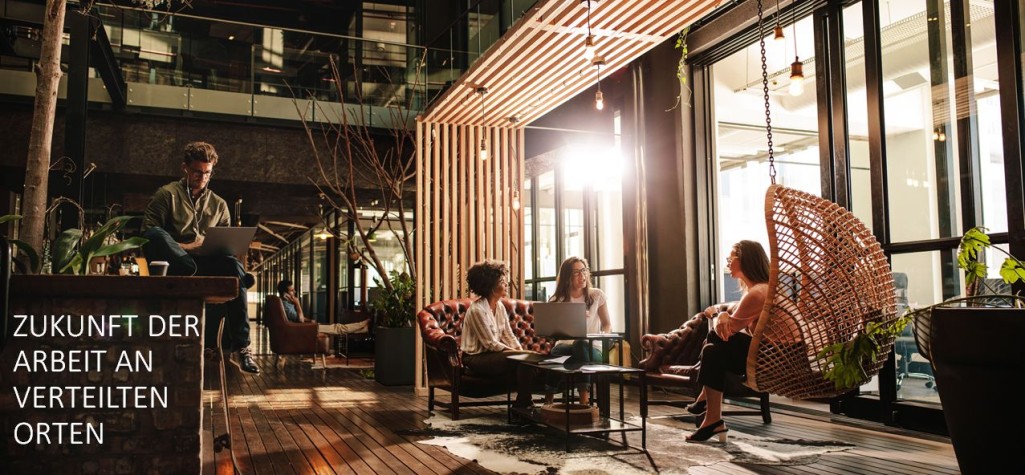FG Immobilienwirtschaft und Baubetriebswirtschaftslehre

Work from Home
Multilokale Arbeit – Empirische Studien der Arbeitssituation von Beschäftigten
Die Arbeitswelt verändert sich mit rasanter Geschwindigkeit
Mit dem ersten Lockdown der Coronapandemie rückte das Phänomen Homeoffice in den Blick der Öffentlichkeit. Wissenschaftlerinnen und Wissenschaftler am Fachgebiet Immobilienwirtschaft und Baubetriebswirtschaftslehre der TU Darmstadt begannen 2020 mit Unterstützung des Fachgebiets Marketing und Personalmanagement mit einer breit angelegten Befragung unter Büroarbeitenden in Deutschland.
Wie und wo wird zu Hause gearbeitet? Wie nehmen Beschäftigte die Arbeit zu Hause wahr? Wie produktiv ist die Arbeit im Homeoffice und was entscheidet über deren Erfolg?
Diesen Fragen ging das Forschungsteam nach. Die Längsschnittstudie lief in drei Wellen im Juni, August und Oktober 2020 ab. Bis zu 952 Beschäftigte beteiligten sich an den drei Befragungswellen, die Zusammensetzung des Panels repräsentiert weitgehend die Bürobeschäftigten in Deutschland.
Mehr zu dem ersten Teil der Studie und deren Ergebnisberichte finden Sie hier.
Einige unfreiwillige Lockdownphasen und mehrere Jahre später ist es 2023 von großer wissenschaftlicher und gesellschaftlicher Relevanz erneut die Thematik des Work from Home zu untersuchen. Das Forschungsteam des FG Immobilienwirtschaft und Baubetriebswirtschaftslehre untersucht im Janaur 2023 in einem zweiten Teil der Studie, mit welchen Herausforderungen und Erfolgen die Menschen heute bei ihrer Arbeit im Homeoffice konfrontiert sind und wie die Arbeitswelt von morgen aussehen könnte.
Im zweiten Teil der Studie werden 1500 Beschäftigte in Deutschland zu ihrer Arbeitssituation zuhause und an weiteren Orten, wie dem Büro oder Coworking Spaces befragt.
Das Ziel des Forschungsprojektes ist es, den Erfolg des Work from Home abseits der Pandemie zu messen. Auf Basis der erhobenen Daten können wissenschaftlich fundierte Erkenntnisse über den Status Quo gewonnen werden, welche in Forschung und Praxis dringend benötigt werden, um die wichtigste Fragen der zukünftige Büroentwicklung zu beantworten. Mit Hilfe der Ergebnisse werden durch die Wissenschaftler der TU Darmstadt Implikationen für Arbeitgeber, Politik, Immobilienwirtschaft und Stadtplanung geschaffen.
Mehr zu dem zweiten Teil der Studie finden Sie hier.
Weitere spannende Forschungsarbeiten zum Thema Multilokale Arbeit sind in den Dissertationen von Lukas Heidt und Yassien Bachtal enthalten.
- Agility and new forms of work: applications, challenges and potentialshier
Abstract: Companies are confronted with various disruptions and a dynamic environment. On the one hand, markets are characterized by uncertainty and dynamics that reflect a need for companies and employees to adapt. On the other hand, the COVID-19-pandemic in particular has significantly increased the importance of working outside the office. Broad segments of the population have had to work on short notice, mostly from home. This circumstance is likely to accompany companies and employees in the future as infrastructure has been established and benefits have become apparent. This cumulative dissertation contributes to the understanding of possible cause-effect relationships and appropriate responses of companies. The thesis focuses on possible out-of-office work that is partial and characterized by adaptability or flexibility. Agile work, as a construct to describe successful work in dynamic and complex environments, is thereby applied in remote work or HW to determine possible success factors and challenges. In addition, corporate support measures are inserted and examined in this research context. With the help of qualitative and quantitative research, the interrelationship between remote work, agile work, and enablers is examined. The first article clarifies the relationship between change management and agility and highlights its role as an enabler in increasing agility or integrating into it. The insight that the increase of agility itself is a profound change and therefore has to be accompanied by change management is central. The second article adapts and transfers the underlying construct of this dissertation, ‘Agile Work’, into the specific context of remote work. Characteristics such as autonomy, flexibility, willingness to learn, adaptability and proactivity are also central indicators for successful work in remote work. However, this positive effect is not insignificantly determined by HRM, since agile employees use special enablers. Companies must provide their employees with work organization guidelines, ‘policies’, to organize on-site and remote work collaboration. The third article qualitatively and quantitatively explores possible policies, examines their prevalence, analyzes them in terms of their flexibility and autonomy, and derives a framework, which can help define this key enabler. The fourth article explores possible specific challenges in the context of HW. It turns out that there is a plethora of challenges. A survey provides information on the expression of these items and an analysis examines the influence of the support perceived by employees: It is shown that the expression of the challenges varies significantly with the support and is therefore a key factor for companies.
- The efficiency scope of work from home: A multidimensional approach and the significance of real estatehier
Abstract:The world of work, particularly the physical organization of work, is undergoing a profound transformation process. The causes of this transformation process are technological innovations, organizational changes, and the increasing pluralization of employee requirements. Even though this transformation process of the physical organization of work began several years ago, the COVID-19 pandemic has significantly increased its speed. As a measure to contain the COVID-19 pandemic, working from home enabled office workers worldwide to gain experience with this workplace. Work from home describes regular working from home, which is made possible using information and communication technologies. This gives employees a direct comparison between working in the office and working from home and allows them to choose their place of work more purposefully depending on their work activities. The widespread introduction of work from home influences life and work on several levels. At an individual level, the question arises as to which employees are generally suitable for working from home. At the level of the working environment, there needs to be more knowledge about the extent to which work from home influences the digital equipment of residential properties. Furthermore, it remains unclear how the interaction between the employee (person) and the working environment (environment) in work from home affects individual work success (fit). This dissertation explores these research questions with the help of a total of five research articles. The first article classifies work from home in a hybrid working environment and uses an international comparison between the United States and Germany. Hybrid working is defined by the distribution of working hours between the office, work from home, and third places of work, and describes a combination of these places of work. The article shows that WFH is a high priority for many employees in a hybrid working environment. While working hours in the office are almost identical in both countries at around one-third, it is clear that third places of work (e.g., coworking spaces) are more important for employees in the United States than Germany. The article shows that this divergence is primarily cultural. Overall, this article shows that employees internationally attach great importance to WFH in a hybrid working environment. The second article addresses the importance of work from home in a hybrid work environment and examines in a preliminary study which aspects enable successful work from home. The results of the article show correlative relationships between spatial, personal, and work-related characteristics on the one hand, and satisfaction and productivity on the other. Consequently, successful work at home is only possible if all three dimensions are met. This article indicates that only around 25 % of employees who can work from home are successful there. The third research article takes up the results of the second study. The aim is to take a closer look at these 25 % of employees who successfully work from home. The results make it clear that more experienced employees who live in well-equipped residential properties and have a high degree of work autonomy can work successfully from home. Career starters, who often live in properties that are not suitable for work from home, are less successful in working from home. The fourth article is specifically dedicated to examining the influence of real estate characteristics on satisfaction and productivity in work from home. Furthermore, the relative importance of real estate characteristics is compared with organizational and socio-psychological characteristics. It is shown that real estate characteristics highly influence satisfaction and productivity in work from home. Compared to organizational and socio-psychological characteristics, real estate characteristics are the most important. The fifth research article delves into the factors that impact the purchase intention of smart homes, shedding light on the heightened inclination towards technology, notably spurred by the COVID-19 pandemic and the surge in remote work. This study investigates the intricate interplay between these aspects, unravelling the nuanced role that the increased affinity for technology, especially in the context of the widespread shift to remote work, plays in shaping consumer attitudes toward smart home adoption. The social environment primarily influences the intention to buy smart homes. However, the results also make it clear that the increased affinity for technology improves attitudes toward such residential properties, leading to a higher purchase intention. With these findings, this dissertation expands research on work from home. Work from home offers potential for both companies and society. At the same time, the dissertation also shows the risks associated with working from home. These potentials can only be realized by taking an individual view of an organization’s workforce and combining the office, work from home, and third places. The dissertation offers a theoretical-conceptual classification in the current state of research and supported by the results, provides implications for practice to meet the challenges in the transformation process of the physical organization of work.
Fragen? Kontaktieren Sie uns!
| Name | Kontakt | |
|---|---|---|

| Prof. Dr. Andreas Pfnür Leiter des Fachgebiets Immobilienwirtschaft und Baubetriebswirtschaftslehre | pfnuer@bwl.tu-... +49 6151 16-24510 S1|02 31 |

Bild: Jonas Rau
| Dr. Kyra Voll Wissenschaftliche Mitarbeiterin am Fachgebiet Immobilienwirtschaft und Baubetriebswirtschaftslehre | |

| Martin Christian Höcker M.Sc. Wissenschaftlicher Mitarbeiter am Fachgebiet Immobilienwirtschaft und Baubetriebswirtschaftslehre | |

| Dr. Yassien Bachtal Wissenschaftlicher Mitarbeiter am Fachgebiet Immobilienwirtschaft und Baubetriebswirtschaftslehre |



